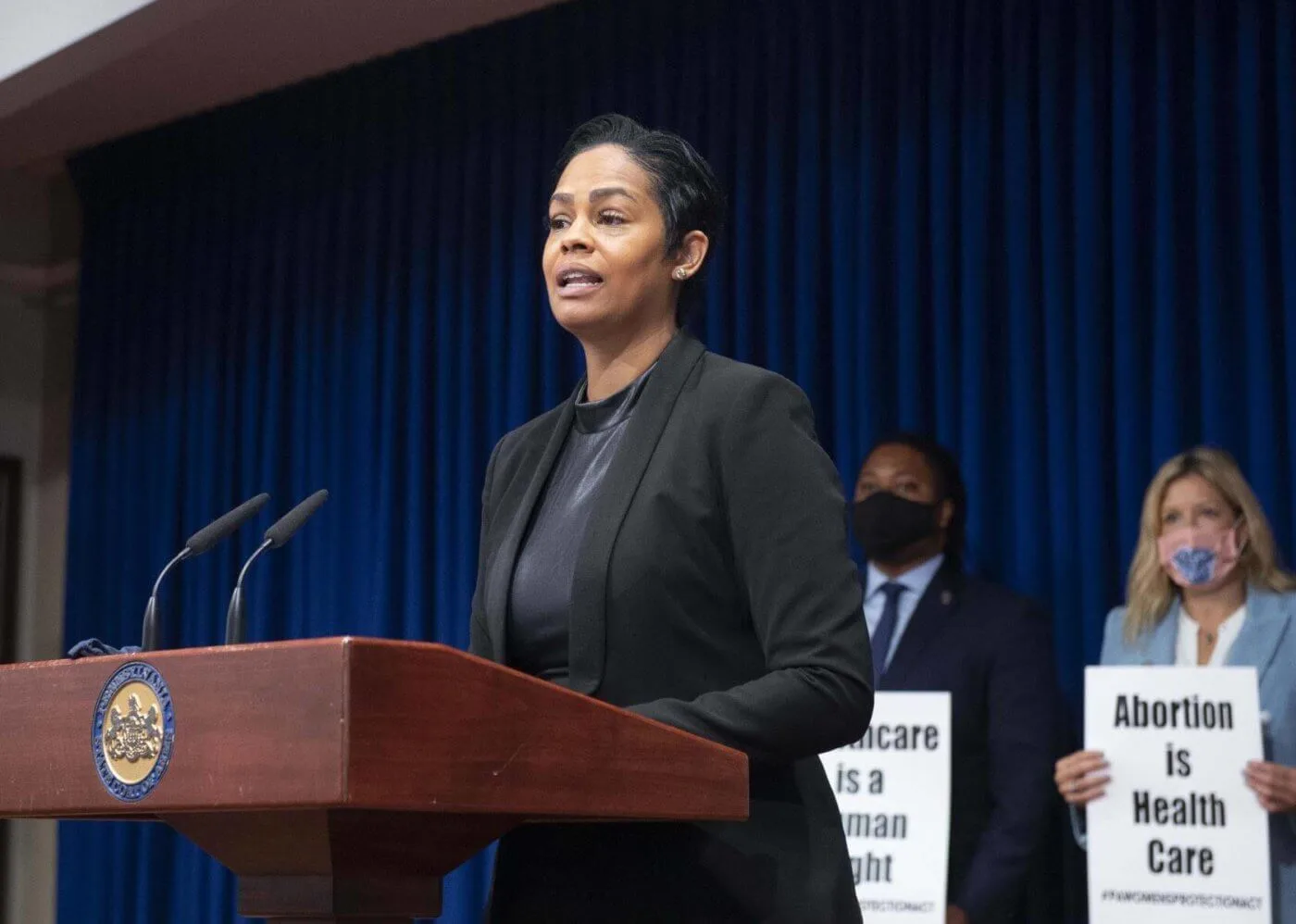
State Rep. Morgan Cephas (D-Philadelphia) speaks at a news conference about the Pennsylvania Women's Health Protection Act. (Courtesy of Pennsylvania House of Representatives)
Republicans are ignoring laws that could help pregnant women, and continuing to pursue harsh anti-abortion laws.
This year, Republicans in the state Legislature proposed and advanced several bills that would limit pregnant people’s access to abortion care.
“In Pennsylvania, we have for a while had a very hostile anti-abortion legislature, when it comes to specifically reproductive and sexual healthcare,” said Lindsey Mauldin, vice president of advocacy and public policy at Planned Parenthood Southeastern Pennsylvania. “But what we’re seeing now is really a boldened attempt to chip away at abortion access from a number of different aspects.”
Mauldin noted that abortion services are not currently available in every county, and the state needs to move in the other direction.
Republicans want to further restrict reproductive rights, and won’t even consider laws made to help people have healthier pregnancies, better postpartum care, and healthier babies.
“We live in a world where women don’t have workplace accommodations, yet we’re forcing them to maintain pregnancies,” she said. “It’s hypocritical.”
Legislation to Limit Access to Abortion Care
House Bill 118 — Final Disposition of Fetal Remains
State Rep. Frank Ryan (R-Lebanon) introduced House Bill 118, which would require the burial of remains of a fetus lost to miscarriage, stillbirth, ectopic pregnancy, or abortion.
Originally, the bill would have required any woman who had a miscarriage, stillbirth, or abortion to fill out a death certificate for the fetal remains, but Ryan amended the bill to remove that requirement.
State Rep. Mary Isaacson (D-Philadelphia) noted that the bill is unnecessary and there is nothing in place now that stops previously pregnant people from burying or cremating fetal remains as they see fit.
”What then is the reason for this bill?” Isaacson asked the day the House passed it. “The answer is that it is not only another political attempt to put legislators in between women and their doctors when it comes to critical medical decisions — something that lawmakers have no right or business doing — but it is also an attempt to insert medical misinformation, religious mandates, and a breakdown of medical privacy into law.”
State Rep. Morgan Cephas (D-Philadelphia) went a step further and called the bill a “thinly veiled tactic… to shame women and their families for daring to have control over their reproductive health and their bodies.”
Other legislators raised concerns about the costs of burial or cremation.
“HB 118 essentially levies a fine on people who may experience pregnancy loss, either by choice or by chance,” state Rep. Danielle Friel Otten (D-Chester) said.
Otten noted that the average cost of cremation is $5,300 and the average cost of burial is $7,849, and concerns about these costs could deter women from seeking necessary prenatal care.
The bill passed the House in June in a 118-83 vote. It is currently under consideration by the Senate Health and Human Services Committee.
House Bill 904 — Heartbeat Bill
State Rep. Stephanie Borowicz (R-Clinton) introduced House Bill 904, which would outlaw abortion for a fetus with a heartbeat.
Currently, abortion is legal up to 24 weeks into a pregnancy.
Under this bill, if a pregnant person wanted to have an abortion, their doctor would be required to perform a physical evaluation to determine if there is a fetal heartbeat and would be prohibited from performing an abortion if a heartbeat is detected.
The bill is sitting in the House Health Committee.
House Bill 1500 — Down Syndrome Protection
State Rep. Kate Klunk (R-York) introduced House Bill 1500, which would ban an abortion based on gender or a Down syndrome diagnosis.
“HB 1500 is an invasion into the exam room and the doctor-patient relationship,” said state Rep. Dan Frankel (D-Allegheny). “This legislation could prevent patients from seeking the information they need to become the best parents possible when they need it most.”
The bill passed the state House in June in a 120-83 vote. It is currently under consideration by the state Senate Health and Human Services Committee.
Senate Bill 956 — Constitutional Amendment Regarding Elective Abortions
State Sen. Judy Ward (R-Blair) proposed Senate Bill 956 on Dec. 15. This bill would amend the state constitution to completely eliminate elective abortion rights and taxpayer funding for related abortion services in Pennsylvania.
The bill was referred to the Senate Health and Human Services Committee.
Legislation to Protect Access to Abortion Care
Pennsylvania Women’s Health Protection Act
State Reps. Malcolm Kenyatta and Morgan Cephas (D-Philadelphia) in October announced a plan to introduce the Pennsylvania Women’s Health Protection Act, which would protect a pregnant person’s access to abortion care at any time during a pregnancy.
The bill, which Kenyatta and Cephas have not yet drafted, would be a piece of state legislation similar to the federal Women’s Health Protection Act. The US House has passed the bill and it is currently under consideration by the US Senate. If the US Senate does not vote to provide federal protections for abortion care, the Pennsylvania Women’s Health Protection Act could provide the protections at the state level.
“Abortion is health care, and health care is a human right,” Kenyatta said in a news release. “Abortion care should be able to be accessed without any barriers, and we should put that into law.”
Legislation to Help People Have Healthier Pregnancies and Babies
House Bill 1173 — Medicaid Expansion for Postpartum Care
Cephas proposed House Bill 1173 in April. The bill would expand pregnancy and post-partum medical assistance to a parent for a year after a child is born. People eligible for pregnancy-related Medicaid must have an income below 215% of the federal poverty guidelines.
Currently, people in Pennsylvania who are eligible are covered for 60 days, and this legislation would provide coverage for an additional 10 months. The American Rescue Plan allows states to expand postpartum Medicaid to a year.
The bill has been sitting in the state House Health Committee, without consideration, since April.
House Bill 1977 — Pennsylvania Support Through Loss Act
State Reps. Liz Hanbidge (D-Montgomery) and Melissa Shusterman (D-Chester) introduced House Bill 1977, the Pennsylvania Support Through Loss Act, in October. The bill would require employers to give 24 hours of paid leave (three 8-hour days) to any employee who suffers the loss of a pregnancy, failed surrogacy arrangement, or failed adoption, or any employee who is a spouse of someone who has suffered those losses.
About 10 to 20% of known pregnancies end in miscarriages, according to the Mayo Clinic. Planned Parenthood suggests that people avoid hard work or exercise for a few days to a week after a pregnancy loss, but emotional recovery can take even longer.
“There are women all over the country at work currently miscarrying and trying to hold that burden alone, without the resources to be able to take the time to go home and heal, or talk to counselors, or see doctors as much as they might want to or need to,” Hanbidge said when she introduced the bill.
The bill has been sitting in the House Labor and Industry Committee, without consideration, since October.
Senate Bill 716 — Pregnant Workers Fairness Act
State Sen. Amanda Cappelletti (D-Montgomery) proposed Senate Bill 716, the Pregnant Workers Fairness Act, in May. The bill would require employers to provide “reasonable accommodations” to pregnant people, such as a chair to sit on, a bottle of water at their workstation, assistance with lifting heavy objects, and uncompensated breaks. It also would require employers to make other changes, such as temporary job restructuring if the job is physically demanding or a modified work schedule, if necessary.
An employer would not be allowed to change wages, privileges, or other job conditions for employees who need accommodations, and would not be allowed to deny employment to a prospective employee who asks for accommodations for pregnancy.
“Three-quarters of women entering the labor force will be pregnant and employed at some point in their lives. Unfortunately, pregnancy discrimination continues to be a problem in Pennsylvania and across the country,” Cappelletti said in a memo. “Pregnant workers are often forced out of the workplace, or required to work in unsafe conditions, leading to long-term detrimental impacts on both their health and their family’s economic security. Usually, the accommodations pregnant employees need are minor, such as sitting on a stool or having a water bottle nearby. While there are a number of federal, state, and local laws that protect pregnant workers, there are significant gaps in these statutes.”
Twelve other states, including Texas, in the US have passed laws to provide reasonable accommodations for pregnant workers.
Senate Bill 716 has been sitting in the Senate Labor and Industry Committee, without consideration, since May.

For Rep. Susan Wild, supporting PA families includes reproductive rights and much more
Rep. Susan Wild wants to be very clear with Pennsylvanians: Donald Trump is committed to taking away women’s reproductive freedom, but he is not...

School districts working with anti-LGBTQ groups can cost your kids’ schools millions
Parents across South Central Pennsylvania are worried about the potential financial impacts working with anti-LGBTQ groups may have on their school...

VIDEO: Trump distances himself from his anti-abortion views
Donald Trump appeared on WGAL on Tuesday and continued to distance himself from his anti-abortion views claiming that reproductive rights are now a...

VIDEO: Community pushback gets school board to rescind decision on denying gay actor’s visit
Cumberland Valley School Board offered a public apology and voted to reinstate Maulik Pancholy as a guest speaker a week after the board voted to...

VIDEO: Project 2025 brings nuclear armageddon back into vogue
Project 2025 is a titanic document, with plans ranging from cutting half of all government employees to targeting reproductive rights on a scale...




